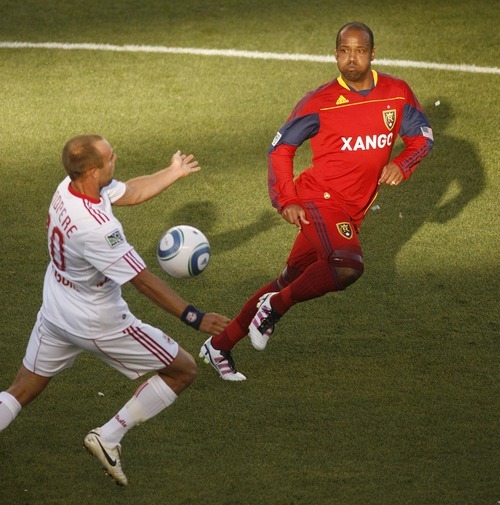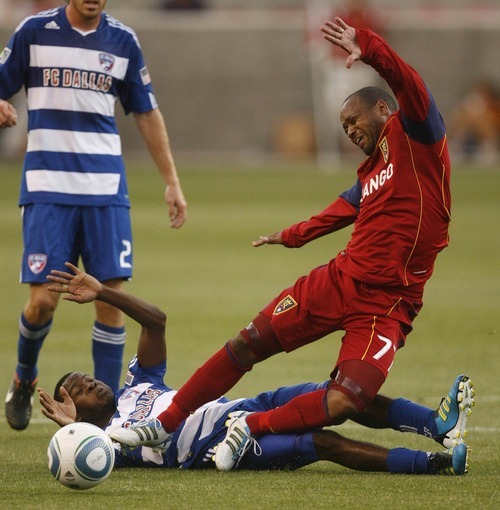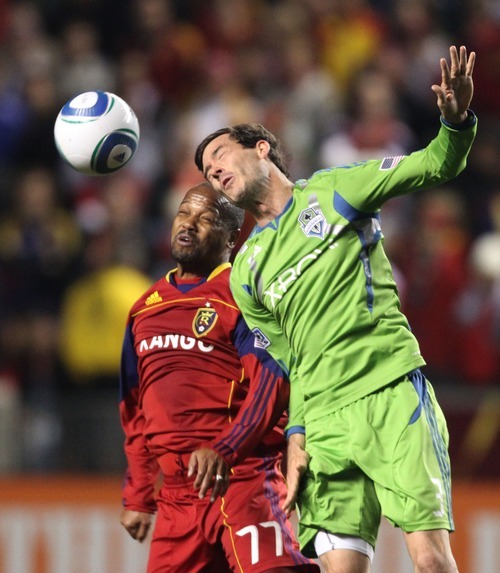This is an archived article that was published on sltrib.com in 2011, and information in the article may be outdated. It is provided only for personal research purposes and may not be reprinted.
The man collapsed and cried.
That was the reaction of Andy Williams to the worst moment of his personal life and the best moment of his professional life: When a doctor told him and his wife, Marcia, on July 4, 2008, that she had been diagnosed with a rare form of leukemia, and when Real Salt Lake won the MLS Cup on Nov. 22, 2009.
He broke down and bawled.
That second moment was made all the sweeter by a promising recovery by Marcia, who had undergone lengthy treatments and a cord blood transplant in the same city — Seattle — where her husband and the rest of his RSL teammates claimed the Cup.
"It was like a super-emotional high for me to have her there," he says. "Words can't describe how that felt. I cried for two days after that game."
The plumbing also backed up a bit this week when Williams, 34, announced his retirement as a player for RSL, a club for which he had competed since its first day in Major League Soccer in 2005. Since that time, Williams had experienced all kinds of things while with the club: losing, embarrassment, a racial epithet hurled at him by an opponent, a coaching change, roster turnover, Marcia's health challenge, winning, a championship, a trip to the White House, being evacuated from his home, success in international competition, and, ultimately, fulfillment.
He was the only original player still with the club, having participated in one of the great transformations in all of sport, Real moving from a laughingstock or, as Williams puts it, "the worst team ever" to a championship-level get-up.
His announcement wasn't all cookies and cream, though. If Williams had his way, he would play another season. But he wasn't offered a contract, so he agreed to work for RSL as a scout identifying and developing young talent. It was a gig he would take, enabling him and his family to stay in Utah, a place the Jamaican now considers home.
Why wouldn't he?
The community here wrapped its arms around Andy and Marcia and their two daughters, putting on fundraisers and offering every kind of imaginable support as they fought their fight against a formidable monster.
"People came out of the woodwork and offered to help," Williams says. "Our neighbors were amazing. Everyone was like angels for us. Everyone tried to help. You never expect that much love to come. We were brought here for a reason. God's plan was for us to come here."
It was Dave Checketts' plan, too.
Or, more accurately, Steve Pastorino's and John Ellinger's plan. RSL's original general manager and coach took Williams with the No. 1 pick in the expansion draft in 2004, grabbing the midfielder from Chicago.
When he arrived in Salt Lake City, the first impression that hit him over the head was the expanse of the mountains: "The beauty of the valley was stunning," he says. "I called my wife and told her they were like the mountains in Jamaica, only with snow on top of them."
His second impression was that he was going to be playing for an awful team. "We wanted to start something new here," he says. "We were probably the worst team ever for the first couple of years. Still, 15,000 people showed up for games in the middle of the week. It was unheard of. I asked myself: 'Why are people wasting their money? I wouldn't be coming if I were them.' "
Williams says it was a sick feeling before games, knowing RSL was going to lose before the first ball was even kicked. When he thinks of that now, he almost laughs, saying the entire culture of the club has changed: "If we do the things we should do, no team in MLS can beat us."
Mixed in the early part of that transition, when the losing was still prevalent, Williams was involved in an on-field incident with a New York Red Bulls player who called him, among other names, "the N-word." Williams reported the affront to MLS officials and spoke loudly and powerfully about the need to rid the sport of such idiocy.
He carried on from there, becoming a fan favorite as the seasons went by.
On the day he and Marcia got the news about her health condition, RSL had a home game that night against Colorado. Initially, he told none of his teammates what was going on. He simply stepped on the field at practice and during games and temporarily escaped the heartache. When he stepped off, it hit him again like a board to the face.
"I could have shut down and crawled into a hole," he says. "I could have sat in the shower for two hours — and I did that. I wanted to drink, but I knew that would make it worse."
It was Marcia who encouraged Andy to get about his business. "She was the strong one," he says.
Williams eventually opened up and accepted the help he needed — from teammates, from friends, from strangers. The love flowed, washing over the entire family.
The winning flowed, too. RSL won the Cup and made its impressive run in the CONCACAF championships, establishing itself as a formidable MLS force. Most notable for Williams, looking back at the early days, is the way his club now views winning as the only option.
"If we lose, it's like somebody's puppy died," he says. "Guys just hate losing. Guys like Kyle Beckerman can't handle it. If they lose, they come off the field and want to fight. You don't want to disappoint a guy like that. It's rubbed off on everybody. Nobody wants to lose, everybody wants to work."
Near the top of Williams' list of memories is RSL's trip last year to the White House, where he got to meet the president and shake his hand: "It was a real honor, a privilege," he says.
Near the bottom is the day fire swelled over the mountain in front of his home in Herriman and he and his family were forced to evacuate — inside of a half-hour. Williams grabbed a few clothes and bolted. When they returned, to their relief, they found only smoke damage.
In May, Marcia had a major scare when she came down with the flu, and because her immune system was weak, she was hooked up to a machine to help her breathe and hospitalized for a month. "At times, she wasn't responding," says Williams. "It was difficult."
Fresh off a doctor's visit on Wednesday, she's doing well. Her energy is up and her cancer is in remission.
Walking off the field now, reflecting back on his years and his experiences as a player, Williams searches through a pack of terms to find the right one to capture his state of mind, his state of heart.
Finally, he settles on a good one.
Gratitude.
"I'm grateful," he says. "It's been a pleasure."
GORDON MONSON hosts "The Gordon Monson Show" weekdays from 2-6 p.m. on 97.5 FM/1280 AM The Zone. Twitter: @GordonMonson.







